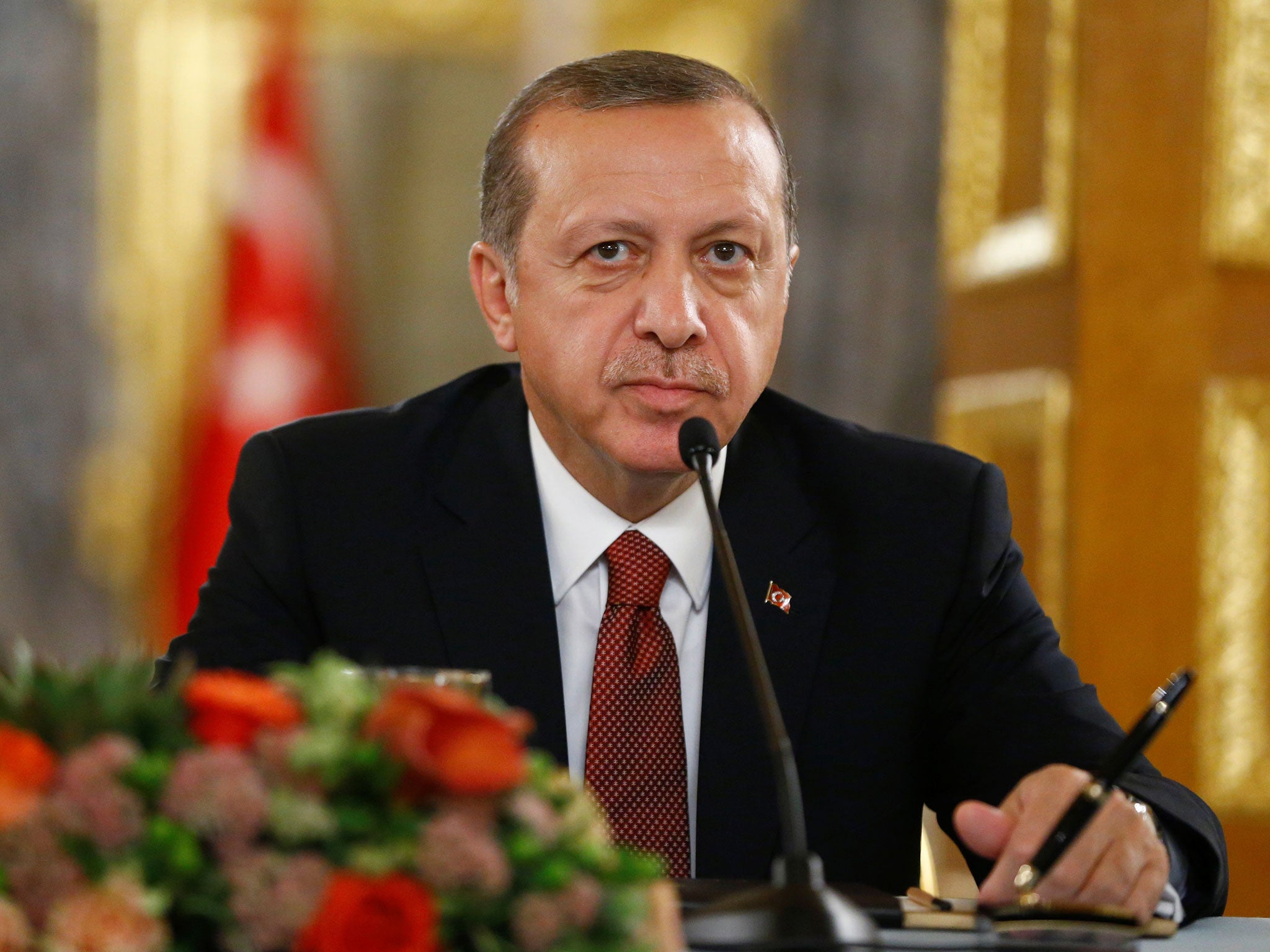Turkey’s President Erdogan tells Iraqi leader to ‘know his place’ over diplomatic spat
Recep Tayyip Erdogan accuses Iraq’s Prime Minister Haider al-Abadi of ‘insulting’

Your support helps us to tell the story
From reproductive rights to climate change to Big Tech, The Independent is on the ground when the story is developing. Whether it's investigating the financials of Elon Musk's pro-Trump PAC or producing our latest documentary, 'The A Word', which shines a light on the American women fighting for reproductive rights, we know how important it is to parse out the facts from the messaging.
At such a critical moment in US history, we need reporters on the ground. Your donation allows us to keep sending journalists to speak to both sides of the story.
The Independent is trusted by Americans across the entire political spectrum. And unlike many other quality news outlets, we choose not to lock Americans out of our reporting and analysis with paywalls. We believe quality journalism should be available to everyone, paid for by those who can afford it.
Your support makes all the difference.President Recep Tayyip Erdogan has warned Iraq’s prime minister he should “know his limits” after he criticised Turkey’s military presence there and said the Turkish army, shaken by a failed coup bid, had not lost so much standing as to take orders from him.
Nato member Turkey shares a 750-mile border with Syria and Iraq and faces threats from the Isis within both. But it is concerned that international efforts to destroy the radical Islamists will leave new dangers in their wake.
The Turkish army, its senior ranks purged following a failed military attempt to overthrow Mr Erdogan in July, launched an incursion into Syria in August to push back Isis and prevent US-backed Kurdish militia fighters from seizing territory. Ankara is wary of Washington's support for what it sees as a hostile Syrian Kurdish force.
Mr Erdogan suggested Turkey could take a similar attitude in Iraq, where expectations are growing of an assault to drive Isis out of the northern city of Mosul.
“We will approach the operation in Iraq, the operation that will be in Mosul soon, with the same attitude,” Mr Erdogan told a meeting of Islamic leaders in Istanbul in televised comments.
“Turkey cannot intervene against the threats right next to it? We will never accept this ... We don’t need permission for this, and we don't plan on getting it.”
The main point of contention is the presence of Turkish troops in Iraq, mainly at the Bashiqa camp in the north of the country, training Sunni Muslim and Kurdish Peshmerga units which Turkey wants to take part in the battle for Mosul.
However, the Shia-led government in Baghdad is keen that its forces be in the forefront of the offensive on the city, the largest under Isis control.
Turkey’s parliament voted two weeks ago to extend the deployment of an estimated 2,000 troops across northern Iraq by a year to combat “terrorist organisations” – a wording broad enough to refer to Kurdish militants as well as Islamic State.
Iraq condemned the vote, and Prime Minister Haider al-Abadi warned Turkey risked triggering a regional war. His government has requested an emergency United Nations Security Council meeting to discuss the issue, and both countries have summoned each other's ambassadors in a mounting diplomatic stand-off.
“The Iraqi prime minister is insulting me, first know your limits,” Mr Erdogan said.
“Iraq had certain requests from us regarding Bashiqa, and now they are telling us to leave. But the Turkish army has not lost so much standing as to take orders from you.”
Turkey argues that involving Shia militias in a drive to expel Isis from Mosul will not bring peace.
“If you try to change the demographic structure in Mosul, you will ignite the fire for a major sectarian war,” Turkish Prime Minister Binali Yildirim told members of his ruling AK Party at a meeting in parliament.
Foreign Minister Mevlut Cavusoglu said Turkey could play the same role in the Mosul offensive or any campaign to take Raqqa, Isis’s stronghold in Syria, as it did with its August incursion into the Syria, when it sent in tanks and fighter jets in support of Syrian rebels fighting the Islamist radicals.
“Turkey can give the support it gave Jarablus to Raqqa or Mosul as well,” Mr Cavusoglu said in an interview on Turkey’s A-Haber television. “Turkey is ready for any kind of support to cleanse Syria and Iraq of Daesh,” he said, using an Arabic term for Isis.
Reuters
Join our commenting forum
Join thought-provoking conversations, follow other Independent readers and see their replies
Comments